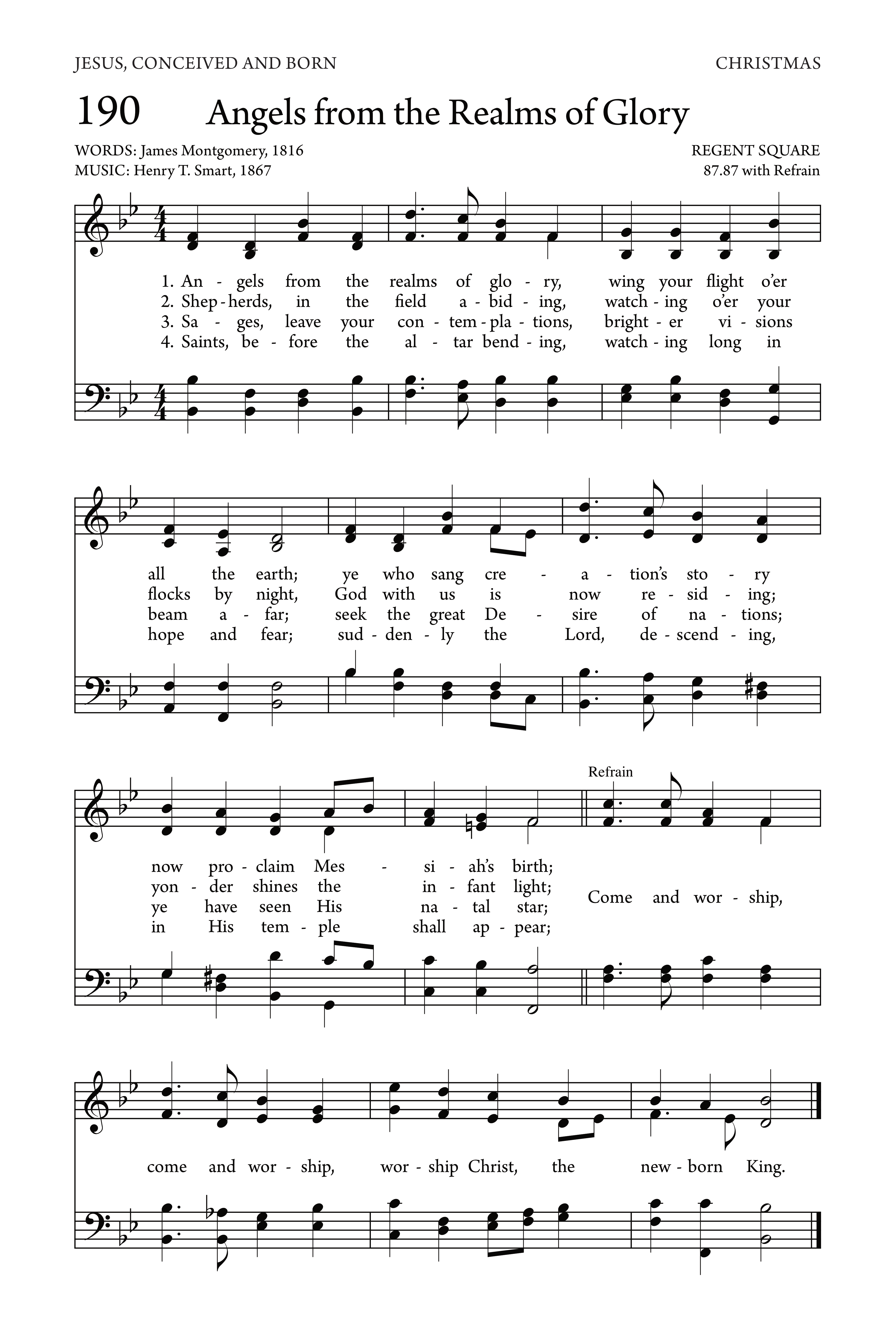Angels from the Realms of Glory
By James Montgomery
Lyrics
wing your flight o'er all the earth;
ye who sang creation's story
now proclaim Messiah's birth:
Come and worship, come and worship,
worship Christ, the newborn king.
watching o'er your flocks by night,
God with us is now residing;
yonder shines the infant light:
brighter visions beam afar;
seek the great Desire of nations;
ye have seen his natal star:
Bible Reference
Luke 2:9
About This Hymn
Text: James Montgomery (1771–1854)
Tune: Regent Square, by Henry Smart (1813–1879)
Scripture Reference: “And, lo, the angel of the Lord came upon them, and the glory of the Lord shone round about them: and they were sore afraid.” — Luke 2:9 (KJV)
When considering the most influential figures in the history of English hymnody, the names of Isaac Watts—commonly recognized as the father of English hymnody—and Charles Wesley—renowned for writing more than 6,500 hymns—are always held in high esteem. However, just after these two giants stands James Montgomery, a man whose contributions to sacred poetry have left an enduring impact. Hymnologist John Julian, an authority on the subject, described Montgomery with high praise: “Montgomery’s devotional spirit was of the noblest type. With the faith of a strong man he united the beauty and simplicity of a child… richly musical without apparent effort, he has bequeathed to the church wealth which could only come from true genius and a sanctified heart.”
James Montgomery was born in 1771 to Moravian missionary parents who served in the West Indies. During his schooling at a Moravian seminary in England, Montgomery received word that both of his parents had died while on the mission field. Grief-stricken, he left the seminary and entered a period of personal uncertainty. Eventually, he found purpose in the world of journalism and literature. At the age of twenty-three, he became editor of the Sheffield Register, a newspaper based in London, and held that role for thirty-one years. Throughout his editorial career, Montgomery used his platform to advocate for social causes, including the abolition of slavery, the defense of the poor, and the promotion of humanitarian reform. Twice imprisoned for writing on controversial issues, he later compiled a volume of poetry titled Prison Amusements, much of it written during those incarcerations. In 1825, he retired from journalism to dedicate himself fully to writing, philanthropy, and the advancement of foreign missions—a cause that remained close to his heart. His work was widely recognized and respected. In 1833, the British government awarded him an annual pension of £150 in appreciation of his significant contributions to literature and public life.
The hymn “Angels, From the Realms of Glory” was first published as a Christmas poem in the Sheffield Register on December 24, 1816. It later appeared in Montgomery’s hymnal titled Montgomery’s Original Hymns, under the heading “Good Tidings of Great Joy to All People.” Today, it is recognized as one of the most beloved Advent and Christmas hymns in the English-speaking world. Its majestic language and sweeping call to worship reflect both Montgomery’s poetic brilliance and his deep personal faith. Each stanza extends a universal invitation to worship the newborn Savior—calling angels, shepherds, sages, saints, and sinners alike. The hymn’s enduring popularity lies in its combination of biblical imagery, theological depth, and lyrical artistry.
The tune most commonly associated with this hymn is Regent Square, composed by Henry Smart—an English organist and composer born in London in 1813. Despite being largely self-taught, Smart earned a reputation as one of the finest organists and hymn tune writers of his time. Remarkably, he composed many of his best-known works during the final fifteen years of his life, a period during which he was completely blind. Regent Square was composed for a hymnal being prepared by Dr. James Hamilton, pastor of the Regent Square Presbyterian Church in London, which was often referred to as the “Cathedral of Presbyterianism.” Smart dedicated the tune to this church, and it was soon adopted widely for its bright, triumphant character—well suited to the joyful proclamation of Montgomery’s text.
In addition to Regent Square, Henry Smart also composed Lancashire, the well-known tune used with “Lead On, O King Eternal.” Beyond his hymn compositions, Smart was a respected authority in the design and construction of church organs. His expertise was sought across England and Scotland, and several of the country’s most celebrated instruments were designed under his guidance. Despite his blindness, he continued to contribute significantly to church music until his death in 1879.
James Montgomery, throughout his lifetime, penned around 400 hymns, many of which are still sung today. One of his other enduring contributions to church music is the Communion hymn “According to Thy Gracious Word.” Yet among his works, “Angels, From the Realms of Glory” remains his most cherished and widely sung hymn. It stands not only as a literary and musical treasure but also as a reflection of Montgomery’s life—a life shaped by loss, inspired by faith, and committed to proclaiming the message of Christ to the world.


📬 Subscribe to Our Devotional Updates
Receive weekly hymns, devotionals, and website features directly in your inbox.
Hymn Information

- Category: Hymn
- Author/Writer: James Montgomery (1816)
- Added: June 5, 2025
- Last Updated: August 20, 2025
- Views: 1461
MIDI File
Recent Blog Posts
-
 How to Develop a Consistent Prayer Schedule
How to Develop a Consistent Prayer Schedule
Dec 11, 2025 -
 How to Forgive Someone Who Deeply Hurt You
How to Forgive Someone Who Deeply Hurt You
Dec 11, 2025 -

-
 Why Christmas Is Celebrated on December 25
Why Christmas Is Celebrated on December 25
Dec 11, 2025 -
 10 Most Renowned Hymn Writers
10 Most Renowned Hymn Writers
Dec 10, 2025
Visit Us on Social Media
Latest from X (Twitter)
Tweets by HymnalLibraryLatest from Facebook
Latest on YouTube
Daily Bible Verse
Disclaimer
The hymns, sheet music, MIDI files, and related content on this website are provided for educational and research purposes only.
- Public Domain: Many of the hymns featured here are in the public domain and may be freely used.
- Copyrighted Works: Some hymns may still be under copyright protection. Where applicable, permission has either been requested from the copyright owner, or the content is shared under the principles of fair use for educational purposes.
⚠️ Important Notice: If you wish to reproduce, distribute, or use any copyrighted hymn beyond personal study or educational use, you must obtain permission directly from the copyright holder. This website does not grant any rights for commercial use yet.
If there is any other question please address it to us in our Contact Page, for further assistance. Thank you for using the site. May God Bless You.